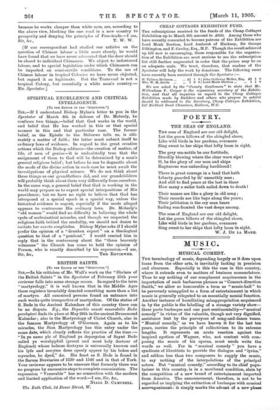[To THE EDITOR OF THE "SPROTATOR.1
I understand Bishop Mylne's letter to you in the Spectator of March 4th in defence of Dr. Moberly, he confuses two things,--belief that God works in the world, and belief that He has worked in this or that special manner in this and that particular case. The former belief, as the Epistle to the Hebrews tells us, is ulti- mately a matter of faith; the latter must submit itself to ordinary laws of evidence. In regard to the great creative actions which the Bishop adduces—the creation of matter, of life, of men of genius—it is undoubtedly true that the assignment of them to God will be determined by a man's general religious belief ; but before he can be dogmatic about the mode of the divine action in each case he must await the investigations of physical science. We do not think about these things as our grandfathers did, and our grandchildren will probably think about them very differently from ourselves. In the same way, a general belief that God is working in the world may prepare us to expect special interpositions of His providence; but we have no right to believe that God has interposed at a. special epoch in a special way, unless the historical evidence is cogent, especially if the mode alleged appears to contravene His ordinary laws. Dr. Moberly's " old woman " would find no difficulty in believing the whole cycle of ecclesiastical miracles, and though we respected the religious faith behind the credulity, we should not desire to imitate her sancta simplicitas. Bishop Mylne asks if I should prefer the opinion of a "drunken expert" on a theological question to that of a "penitent." I would remind him in reply that in the controversy about the " three heavenly witnesses " the Church has come to hold the opinion of Porson, who is exactly described by his expression.—I am, Sir, &c., THE REVIEWER.










































 Previous page
Previous page